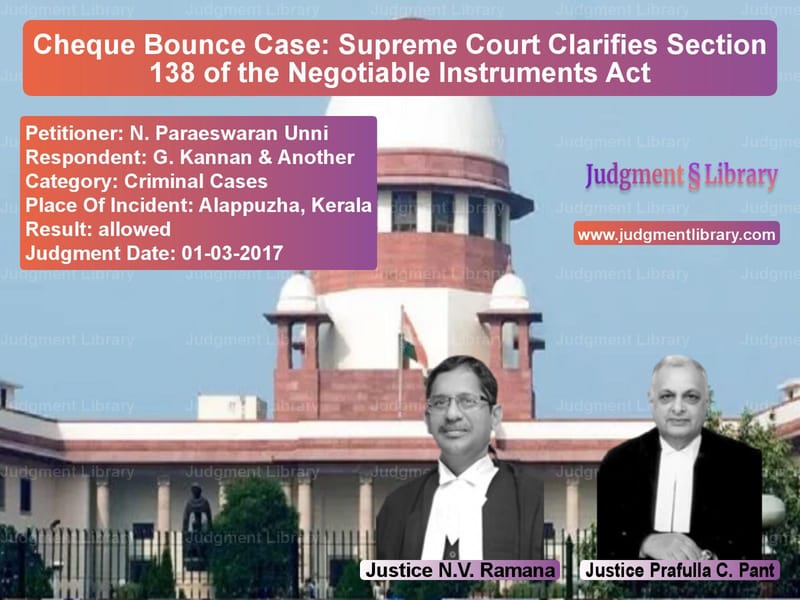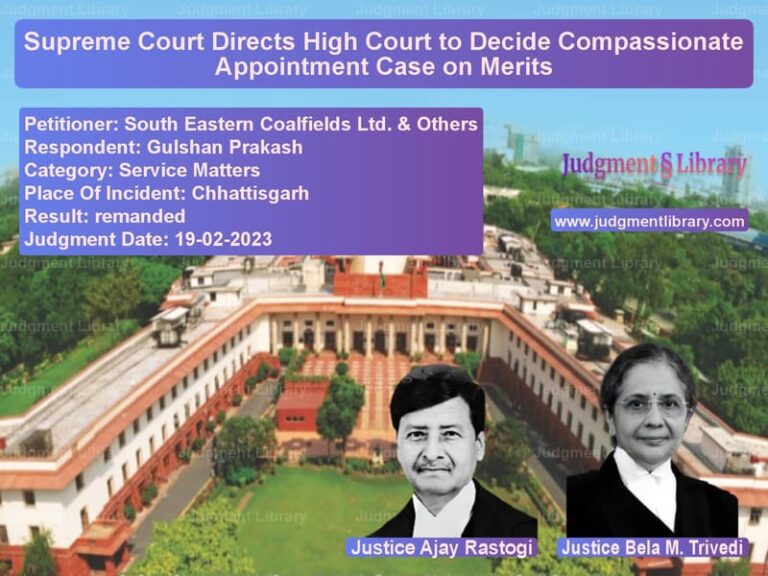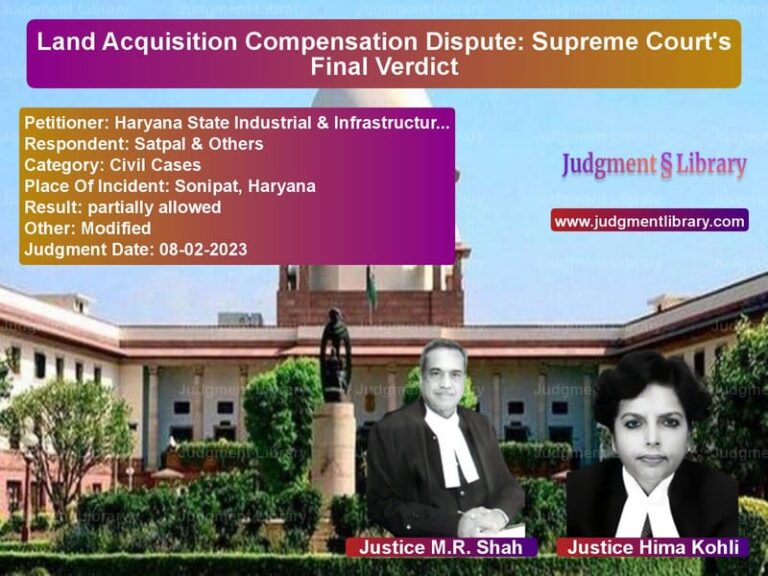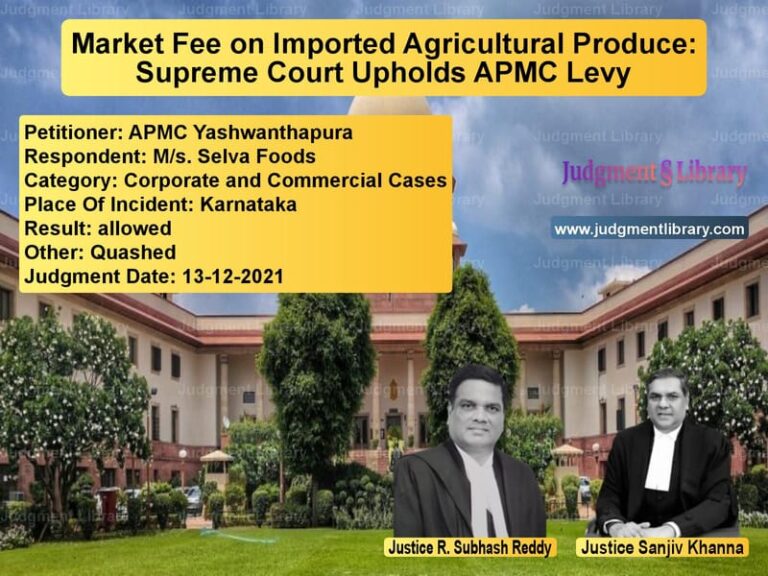Cheque Bounce Case: Supreme Court Clarifies Section 138 of the Negotiable Instruments Act
The Supreme Court of India, in N. Paraeswaran Unni vs. G. Kannan & Another, ruled on the interpretation of Section 138 of the Negotiable Instruments Act, 1881 (N.I. Act). The case involved a cheque bounce dispute, where the accused challenged his conviction on procedural grounds. The Supreme Court ultimately reinstated the conviction, clarifying key aspects of notice service, limitation periods, and compliance with the N.I. Act.
Background of the Case
The case originated from a loan transaction where the respondent, G. Kannan, borrowed Rs. 64,000 from the appellant, N. Paraeswaran Unni, on October 13, 1990. To repay the debt, the respondent issued three cheques:
- Cheque for Rs. 10,000, dated October 13, 1990
- Cheque for Rs. 25,000, dated October 13, 1990
- Cheque for Rs. 29,000, dated October 8, 1990, drawn by K. Rajesh, Development Officer, LIC
The first two cheques were presented for payment on April 4, 1991, but were dishonored on April 5, 1991 with the endorsement “Refer to Drawer.” The appellant was notified by his bank on April 8, 1991. Following this, he issued a legal notice to the respondent on April 12, 1991, which was returned with the endorsement “Intimation served, addressee absent.”
A second legal notice was sent on May 4, 1991, which was also returned, this time marked as “Refused, returned to sender.” The respondent failed to make the payment, prompting the appellant to file a private complaint under Section 138 of the N.I. Act on May 23, 1991.
Key Legal Issues Considered
- Whether the statutory notice under Section 138(b) of the N.I. Act was properly served within the prescribed period.
- Whether the High Court was justified in reversing the concurrent findings of the Trial Court and Appellate Court.
- Whether a second notice sent beyond the statutory period invalidates the proceedings.
Petitioner’s Arguments (N. Paraeswaran Unni)
- The first legal notice was sent within the 15-day period prescribed under Section 138(b) of the N.I. Act.
- The second notice was merely a reminder and did not affect the validity of the complaint.
- The Trial Court and Appellate Court both correctly convicted the respondent based on evidence.
- The High Court erred in dismissing the complaint on technical grounds.
Respondent’s Arguments (G. Kannan)
- The first notice was not properly served, and the second notice, which was beyond the 15-day period, could not rectify the defect.
- The complaint was filed based on the second notice, making it legally invalid.
- The High Court correctly held that the conviction was unsustainable due to procedural non-compliance.
Supreme Court’s Observations
The Supreme Court carefully analyzed Section 138 of the N.I. Act and its provisos, emphasizing that:
- A cheque must be presented within six months of issuance or its validity period, whichever is earlier.
- The payee must send a demand notice within 15 days of receiving information about dishonor from the bank.
- The drawer has 15 days from receipt of notice to make payment before legal action is initiated.
The Court ruled that the first notice, sent on April 12, 1991, was properly addressed and served through registered post. Relying on Section 27 of the General Clauses Act, 1897, and Section 114 of the Indian Evidence Act, 1872, the Court held:
“Once notice is sent by registered post with the correct address, service is presumed unless rebutted by the recipient.”
The Court also ruled that the second notice was irrelevant and did not affect the validity of the proceedings:
“A subsequent notice cannot override the legal effect of a prior valid notice.”
Supreme Court’s Ruling
- The Supreme Court allowed the appeal and set aside the High Court’s ruling.
- The conviction and sentence imposed by the Trial Court and Appellate Court were reinstated.
- The respondent was given an opportunity to pay Rs. 2,00,000 as compensation instead of serving a three-month jail sentence.
- Failure to pay the amount within the stipulated period would result in the original sentence being enforced.
Key Takeaways from the Judgment
- Statutory notices under Section 138 must be sent within the prescribed period, but once sent through registered post, service is presumed.
- A second notice does not invalidate the proceedings if the first notice was correctly issued.
- High Courts must not interfere with concurrent findings unless there is a clear miscarriage of justice.
- Cheque dishonor cases must be strictly scrutinized to prevent evasion of liability.
Conclusion
The Supreme Court’s ruling in N. Paraeswaran Unni vs. G. Kannan reinforces the stringent requirements of the Negotiable Instruments Act and protects creditors from unscrupulous drawers of cheques. By reinstating the conviction, the Court has emphasized the importance of adhering to legal timelines while ensuring that technical objections do not defeat the intent of the law.
Don’t miss out on the full details! Download the complete judgment in PDF format below and gain valuable insights instantly!
Download Judgment: N. Paraeswaran Unni vs G. Kannan & Another Supreme Court of India Judgment Dated 01-03-2017.pdf
Direct Downlaod Judgment: Direct downlaod this Judgment
See all petitions in Cheque Dishonour Cases
See all petitions in Fraud and Forgery
See all petitions in Debt Recovery
See all petitions in Judgment by N.V. Ramana
See all petitions in Judgment by Prafulla C. Pant
See all petitions in allowed
See all petitions in supreme court of India judgments March 2017
See all petitions in 2017 judgments
See all posts in Criminal Cases Category
See all allowed petitions in Criminal Cases Category
See all Dismissed petitions in Criminal Cases Category
See all partially allowed petitions in Criminal Cases Category







